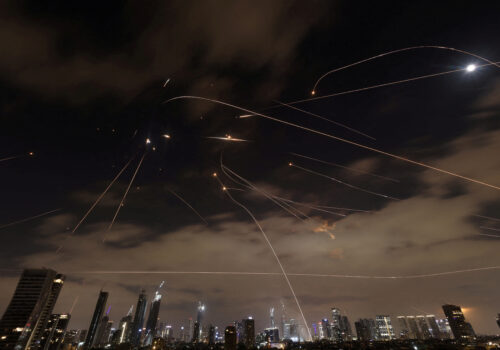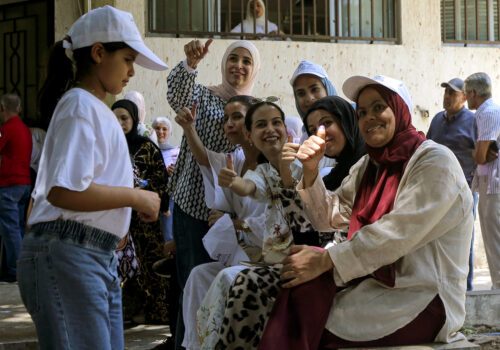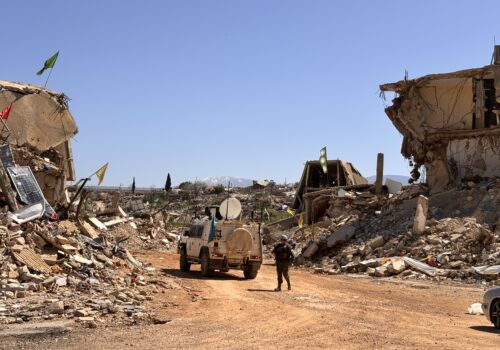Why Hezbollah is unlikely to engage in the Israel-Iran war—for now
Israel’s inevitable strike on Iran’s nuclear facilities has finally occurred. The Israelis on Friday launched extensive, non-stop airstrikes targeting Iranian nuclear and military sites, coupled with assassinations of Tehran’s senior-most officers and nuclear scientists. Iran had built up Hezbollah’s massive arsenal to deter precisely such an Israeli action and launch the first retaliatory strikes if it nevertheless occurred. Yet, as wave after wave of Israeli jets continue to strike Iran, Israel’s northern border remains quiet—underscoring the significant damage the Lebanese-based group absorbed during its own recent war with Israel.
This quiet is likely to continue. Tehran is unlikely to order Hezbollah, in its current battered state, to enter the fray unless Iran feels its regime is in existential danger.
So far, Hezbollah has sufficed with tame condemnations of the Israeli strikes—unusual for the typically verbally bellicose group. In one instance, an anonymous alleged official said Hezbollah “will not initiate its own attack” against Israel. Meanwhile, Hezbollah’s more passionate official statements expressed solidarity with Iran, but fell far short of declaring hostilities.
Secretary-General Naim Qassem sounded like he was awaiting Iranian orders. “We in Hezbollah,” he wrote, “support the Islamic Republic of Iran’s rights and it stances, and in every step and procedure it takes to defend itself and its choices.”
Hezbollah is holding its fire—verbally and physically—because it is operating under unprecedented constraints. The group never possessed conventional parity with Israel, but the anticipated destructiveness of its massive arsenal could at least create a deterrent “balance of terror” with its Israeli enemies. However, during their recent war, Israel wiped out Hezbollah’s senior-most political and military leadership and a significant portion of its strategic arsenal. This has considerably degraded Hezbollah’s ability to mount a serious attack, let alone restart the conflict and prosecute it to a stalemate—the group’s definition of victory. Hezbollah, which has barely begun to mend these deep Israeli-inflicted wounds, must also now contend with near-daily Israeli strikes on its remaining assets and personnel.
SIGN UP FOR THIS WEEK IN THE MIDEAST NEWSLETTER
Meanwhile, domestic considerations are also impacting Hezbollah’s calculus—and will also affect Iran’s decision on whether and how to activate its formerly most powerful proxy. In September of 2024, Arab Barometer found that 70 percent of Lebanese view Hezbollah negatively. After the war, their calls for the group’s disarmament forced Hezbollah into a dialogue with President Joseph Aoun over its arsenal. These domestic conditions are far from ideal for the group. But Lebanese displeasure remains passive, and Aoun has adopted a conciliatory and unhurried approach to these talks, even making important concessions to Hezbollah on the critical post-war reconstruction file. If matters remain unchanged, they afford the group a good chance of reconstituting its strength over time. But dragging Lebanon into another destructive war not its own, mere months out from the end of the last one, could torpedo talks with Aoun and leave Hezbollah exposed to increased and intensified public anger.
If this anger seeps into Hezbollah’s Lebanese Shiite support base, the group would be facing an existential crisis. This segment of the Lebanese population has borne the brunt of all the group’s war, including the one it provoked with Israel on October 8, 2023. Utilizing propaganda to spin the war as a necessary preemption of imminent Israeli aggression and post-bellum stop-gap measures—like housing its displaced supporters in prefabricated homes—Hezbollah has been able to largely retain pre-war levels of Lebanese Shiite support. At the very least, the group has delayed a massive Shiite defection until the group can regain its footing and return to keeping them in its orbit through its traditional carrot-and-stick approach.
But only a small portion of Hezbollah’s Shiite support base is comprised of hardened Khomeinist ideologues. The rest back the group for pragmatic reasons, particularly its promise to improve their lives and collective standing inside Lebanon while protecting them from foreign threats—namely, Israel. Their patience with the group’s ideological adventures, which already brought ruin upon them for the sake of the Palestinians, is therefore not infinite.
Now, Hezbollah is promising to rebuild their homes and villages, directly or through funding from the Lebanese state. If Hezbollah instead pulls Lebanese Shiites into an Israeli-Iranian war, then whatever latent anger may be bubbling beneath their apparent placidity could very well erupt. Hezbollah could then lose the critical social support, and resulting political influence, that has long shielded the group from any attempts by the Lebanese state or army to restrain or disarm it for fear of provoking a civil war.
But Hezbollah is ultimately a self-described extension of the Islamic Republic of Iran, notwithstanding the group’s presence in Lebanon and the weight of Lebanese dynamics on its decisions. Tehran’s priorities, then, will determine the organization’s next moves.
The Iranian regime is a messianist theocracy. It is motivated by an eschatological end-goal, namely, replacing the international liberal order, which Tehran and its proxies view as inherently unjust, with the global rule of the returned Twelfth Shiite Imam, the Mahdi. This objective, more important to Iran than its preparatory steps of destroying Israel and weakening the United States, is irrational from a secular or external perspective. But to Iran’s leaders, it is the logical conclusion of their belief system, and they believe it depends on the survival of the Khomeinist regime and its revolutionary exports. Far from being the “mad mullahs” of popular imagination, they are pursuing this destructive goal with calculated pragmatism.
Therefore, unlike similarly motivated actors like the Islamic State of Iraq and al-Sham (ISIS), Iran participates in the global system it hates. Rather than war against that system and risk its own destruction, Tehran instead simultaneously advances its goals and grows its strength while undermining it from within. Iran therefore creates durable alliances, builds relationships, and engages in diplomatic initiatives that would have been anathema to an actor like ISIS. This contributes to the regime’s longevity and durability , and makes it a significantly more dangerous Western adversary.
This pragmatic mindset will dictate both Iran’s next steps and its instructions to its proxies, including Hezbollah. Tehran, then, is unlikely to activate what remains of its proxies and their capabilities unless it feels Israel’s strikes are intentionally or incidentally jeopardizing the regime’s survival. Such an activation would serve as a desperate effort to force the Israelis to desist, or to inflict as much harm as possible upon their Zionist adversaries before succumbing.
But, as far as can be told, Israel is not pursuing regime change. Jerusalem’s stated goal is to degrade Iran’s nuclear weapons program and damage or destroy its ability to produce ballistic missiles. While this will certainly weaken the regime, including domestically, it will not bring about its demise absent any unintended consequences. Rather than unnecessarily risk Hezbollah’s demise between Israeli retaliation and Lebanese ire, Iran is therefore likely to leave its recovering primary proxy in reserve: to advance post-war reconstruction efforts that will placate Lebanese Shiites, retain their support, and provide the group a pathway to regeneration and the resumption its role as an active Iranian regional asset.
David Daoud is senior fellow at the Foundation for Defense of Democracies, where he focuses on Israel, Hezbollah, and Lebanon affairs. Follow him on X @DavidADaoud.
Further reading
Mon, Jun 16, 2025
Twenty questions (and expert answers) on the Israel-Iran war
MENASource By
The escalation between Israel and Iran has raised many important questions about a region already facing crises on multiple fronts.
Wed, Jun 4, 2025
What Lebanon’s municipal election results mean for Hezbollah
MENASource By David Daoud
Municipal election results did not demonstrate the militant group’s dominance over Lebanon’s Shiites, but Hezbollah nevertheless retains popularity.
Tue, Apr 29, 2025
Dispatch from the UN Blue Line: Israel’s ‘systematic destruction’ in Lebanon
MENASource By Nicholas Blanford
If Hezbollah refuses to disarm, Israel would almost certainly escalate its attacks possibly to the extent of resuming the war in Lebanon.
Image: Iranian men hold the flag of Lebanon's Hezbollah, a flag of Iran, and a portrait of Iran's Supreme Leader, Ayatollah Ali Khamenei, during a religious rally called the 10km party to condemn Israeli attacks on Iran, in downtown Tehran, Iran, on June 14, 2025. (Photo by Morteza Nikoubazl/NurPhoto)NO USE FRANCE



